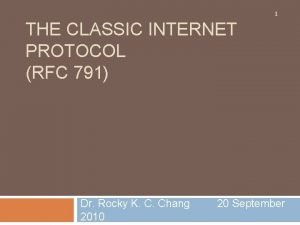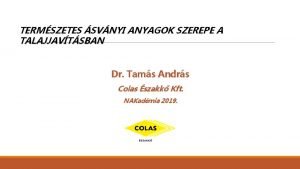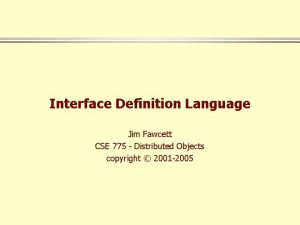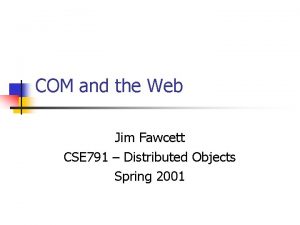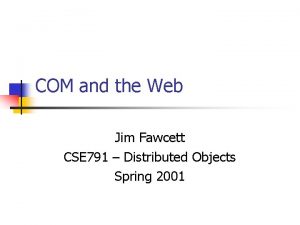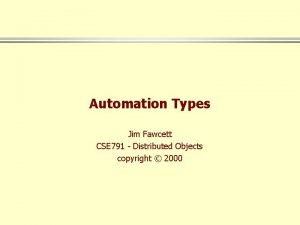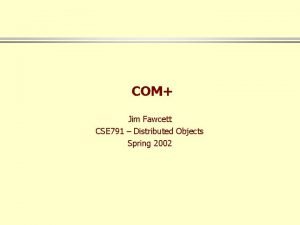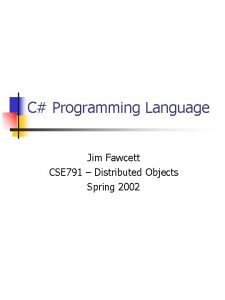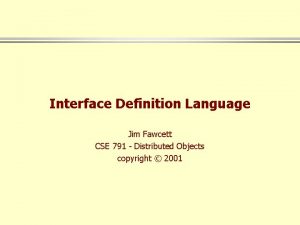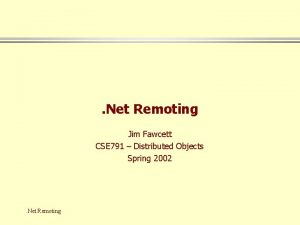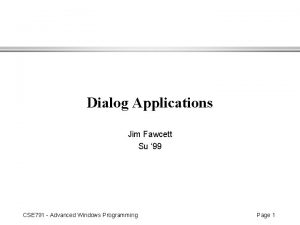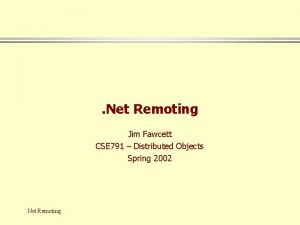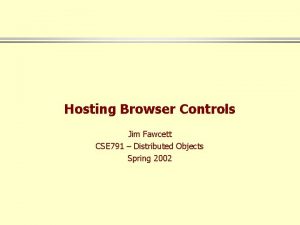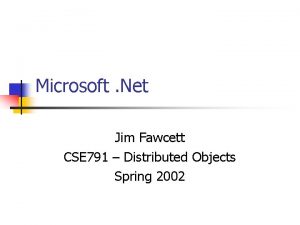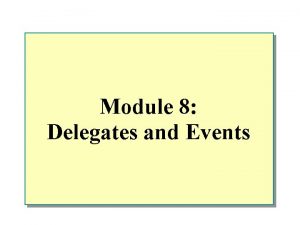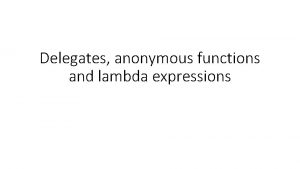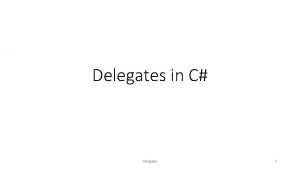CLR Events and Delegates Jim Fawcett CSE 791






![Syntax · Declare Delegate (in publisher): – Public delegate [return type] [delegate name] ( Syntax · Declare Delegate (in publisher): – Public delegate [return type] [delegate name] (](https://slidetodoc.com/presentation_image_h/b0380cbadbccf49d7ca04f496c2feb20/image-7.jpg)











- Slides: 18

CLR Events and Delegates Jim Fawcett CSE 791 – Distributed Objects Spring 2002

References · Applied Microsoft. Net Programming, Jeffrey Richter, Microsoft Press, 2002

Events · Events are both physical and logical: – A physical event is the initiation or completion of some action that the program needs to know about, e. g. , a mouse button down, keypress action, or some specific state in your program. – A logical event is a language construct, explained below. · Events are members of CLR classes. They promise three things: – The ability for other objects to register interest in the event – The ability to unregister for the event – That the object defining the event will maintain a list of registered objects and notify them when the physical event occurs. · Events are CLR constructs, that is, they are available to all languages that support the CLR: – C#, managed C++, Visual Basic, Jscript, …

Callbacks · A callback is a pointer to a function that is called when some event occurs. · Usually, a class defines methods for other objects to call. · A callback is different. A callback is a request for another class to implement a function with a specific signature that this class will invoke. – A callback is a method pointer that the defining class declares, giving the method’s signature – Some other class is responsible for implementing the function to be called and registering the name of that function by passing back a pointer to the defining class. – The defining class uses the function pointer to invoke the implementor’s function when some event occurs. · Callbacks are a general programming technique that have been used ever since event-based programming began. · The CLR supports callbacks with an event keyword and a delegate type.

Publish and Subscribe · A callback is declared and invoked by the publisher of an event. – Declaration sets the signature that must be used for the callback. – A callback is invoked by the publisher every time an event occurs. · A callback is defined by a subscriber class. – The subscriber defines a method with the same signature declared by the publisher in its callback declaration. • This function handles the event – The subscriber then registers its event handler function by passing back a pointer to the function to the publisher.

Delegates · Delegates implement the callback mechanism. They: – Provide a typesafe way to define a callback. Defines callback – Implement the ability to call several methods in sequence. function – Support calling of both static and instance methods. signature · Delegates are declared and used in one class, created in another: – Publisher class, pub. Class, declares a callback type: public delegate return. Type Callback. Name([callback arg], …); – Subscriber class, sub. Class, creates a delegate, handing it a pointer to the event handler function: pub. Class. Callback. Name cb = new pub. Class. Callback. Name(sub. Class. fun 1); cb += my. Class. Callback. Name(sub. Class. fun 2); – Used in pub. Class: If function is if(cb != null) static use class cb(callback args); // calls sub. Class. fun 1, fun 2 name, if nonstatic use object name.
![Syntax Declare Delegate in publisher Public delegate return type delegate name Syntax · Declare Delegate (in publisher): – Public delegate [return type] [delegate name] (](https://slidetodoc.com/presentation_image_h/b0380cbadbccf49d7ca04f496c2feb20/image-7.jpg)
Syntax · Declare Delegate (in publisher): – Public delegate [return type] [delegate name] ( [list of parameters] ); · Declare Event (in publisher): – [modifier] event [delegate name] [event identifier]; · Register Callback Function (in subscriber): – [delegate name] [delegate object] = new [delegate name]([callback 1 name]); – [delegate object] += new [delegate name]([callback 2 name]); · Invoke Callback Function: – If([delegate object != null) [delegate object]([list of arguments]); – in [list of arguments] types must match those in [list of parameters] in delegate declaration

Conventions · Convention: – By convention the Delegate type accepts two parameters: • object sender A reference to invoker of the callback • Event. Args e An instance of a class derived from Event. Args that wraps data needed by the Application’s callback function. – And returns void · The CLR predefines a “standard” delegate: – delegate void System. Event. Handler(object sender, Event. Args e);

Event. Args Class · public class Event. Args : object { // Fields public static readonly Event. Args Empty; // Constructors public Event. Args(); // Methods } public virtual bool Equals(object obj); virtual int Get. Hash. Code(); Type Get. Type(); virtual string To. String();

Delegate Class · When you declare a delegate: public delegate rtn My. Event. Handler(arg 1, arg 2); · The compiler generates a nested class: public class My. Event. Handler : System. Multicast. Delegate { public My. Event. Handler(object target, Int 32 method. Ptr); // ctor public virtual rtn invoke(arg 1, arg 2); // what’s called // these methods support asynchronous callbacks public virtual IAsync. Result Begin. Invoke( arg 1, arg 2, Async. Callback callback, object Obj ); public virtual void End. Invoke(IAsync. Result result); }

System. Multicast. Delegate Class · public abstract class Multicast. Delegate : Delegate, ICloneable, System. Runtime. Serialization. ISerializable { // Fields // Constructors // Properties public Method. Info Method { get; } public object Target { get; } // Methods } public virtual object Clone(); public object Dynamic. Invoke(object[] args); public virtual bool Equals(object obj); public virtual int Get. Hash. Code(); public virtual Delegate[] Get. Invocation. List(); public virtual void Get. Object. Data( System. Runtime. Serialization. Info info, System. Runtime. Serialization. Streaming. Context context ); public Type Get. Type(); public virtual string To. String(); Dynamic. Invoke is used by derived class’s invoke function

System. Delegate Class · public abstract class Delegate : object, ICloneable, System. Runtime. Serialization. ISerializable { // Fields // Constructors Combine adds a new callback method // Properties public Method. Info Method { get; } public object Target { get; } // Methods } public virtual object Clone(); public static Delegate Combine(Delegate a, Delegate b); public static Delegate Combine(Delegate[] delegates); public static Delegate Create. Delegate(Type type, System. Reflection. Method. Info method); public static Delegate Create. Delegate(Type type, object target, string method); public static Delegate Create. Delegate(Type type, Type target, string method); public static Delegate Create. Delegate(Type type, object target, string method, bool ignore. Case); public object Dynamic. Invoke(object[] args); public virtual bool Equals(object obj); public virtual int Get. Hash. Code(); public virtual Delegate[] Get. Invocation. List(); Remove deletes a public virtual void Get. Object. Data( System. Runtime. Serialization. Info info, callback method System. Runtime. Serialization. Streaming. Context context ); public Type Get. Type(); public static Delegate Remove(Delegate source, Delegate value); public virtual string To. String();

Delegate Invocation · When a class method invokes a callback: C. My. Event. Handler my. Event. Handler = new C. My. Event. Handler(func) : if(my. Event. Handler != null) my. Event. Handler(arg 1, arg 2); · The compiled code is doing this: if(my. Event. Handler != null) my. Event. Handler. invoke(arg 1, arg 2);

Event Class · When the compiler sees this: public delegate rtn My. Event. Handler(arg 1, arg 2); public event My. Event. Handler my. Ev; · It generates these statements in your class for the event: – Private My. Event. Handler my. Ev = null; // private delegate field – [Method. Impl. Attribute(Method. Impl. Options. Synchronized)] public void add_my. Ev(my. Event. Handler handler) { my. Ev = (my. Event. Hander)Delegate. Combine(my. Ev, handler); } – [Method. Impl. Attribute(Method. Impl. Options. Synchronized)] public void remove_my. Ev(my. Event. Handler handler) { my. Ev = (my. Event. Hander)Delegate. Remove(my. Ev, handler); }

Default System. Event. Handler Class · public sealed class Event. Handler : Multicast. Delegate, ICloneable, System. Runtime. Serialization. ISerializable { // Constructors public Event. Handler(object, Int. Ptr method); // Properties public Method. Info Method { get; } public object Target { get; } // Methods } public virtual IAsync. Result Begin. Invoke( object sender, Event. Args e, Async. Callback callback, object ); public virtual object Clone(); public object Dynamic. Invoke(object[] args); public virtual void End. Invoke(IAsync. Result result); public virtual bool Equals(object obj); public virtual int Get. Hash. Code(); public virtual Delegate[] Get. Invocation. List(); public virtual void Get. Object. Data( System. Runtime. Serialization. Info info, System. Runtime. Serialization. Streaming. Context context ); public Type Get. Type(); public virtual void Invoke(object sender, Event. Args e); public virtual string To. String();

Publisher’s Responsibilities 1. Define a nested type derived from System. Event. Args to package arguments needed by the event handler functions. – If you don’t need any, skip this step and just use an Event. Args object. 2. Define a delegate type specifying the prototype for the event handler. 3. Declare an event in the publisher class using the delegate you just defined. 4. Define a protected virtual method responsible for using the delegate to notify subscribers. The publisher calls this method when the event occurs, passing to it the Event. Args instance. 5. Define the processing that results in events. When an event occurs, call the notification function defined above.

Subscriber’s Responsibilities · Provide a constructor that accepts a reference to a Publisher instance, say pub. – In the constructor you construct a new instance of Publisher’s delegate: pub. the. Event += new Publisher. the. Event. Handler(sub. Handler); · Define a message handler that accepts the parameters specified by the delegate and returns the type specifed by the delegate. – Usually the arguments are object sender and the publisher’s Event. Args object. Private void sub. Handler(object sender, Publisher. Pub. Event. Args e) { // handle message }

Application’s Responsibilities · Construct a Publisher object: Publisher pub; · Construct a Subscriber object: Subscriber(pub); · Call pub’s method(s) to perform the application’s activities.
 A word 791
A word 791 Rfc791
Rfc791 Bodrogkeresztúri riolittufa
Bodrogkeresztúri riolittufa Brian fawcett
Brian fawcett Peek vs gurney
Peek vs gurney Brian fawcett
Brian fawcett Where was hamilton born
Where was hamilton born Philippa fawcett
Philippa fawcett Barry fawcett
Barry fawcett Dennis fawcett
Dennis fawcett Dr richard fawcett
Dr richard fawcett Graham fawcett
Graham fawcett Fawcett definition
Fawcett definition Barry fawcett
Barry fawcett Jonathan ruby
Jonathan ruby Point of information mun examples
Point of information mun examples Welcome all delegates
Welcome all delegates Welcome to all delegates
Welcome to all delegates Oie delegates
Oie delegates

